digestive support
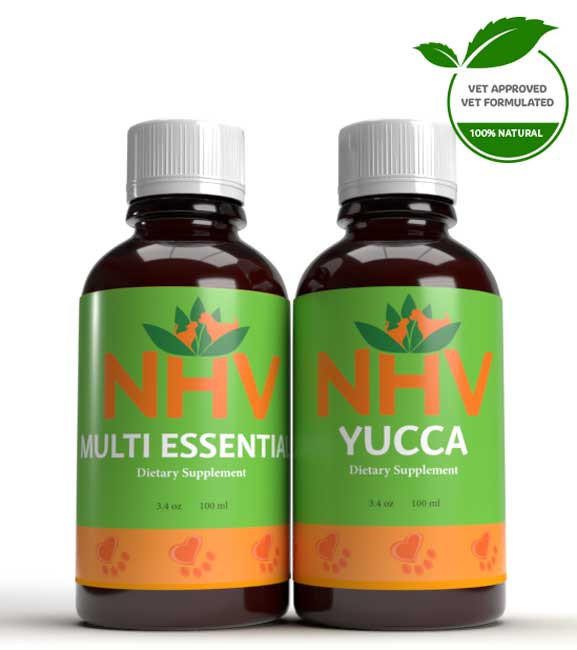
free shipping over $100 (USA & Canada)
1-877-937-4372 the pet expert hotline
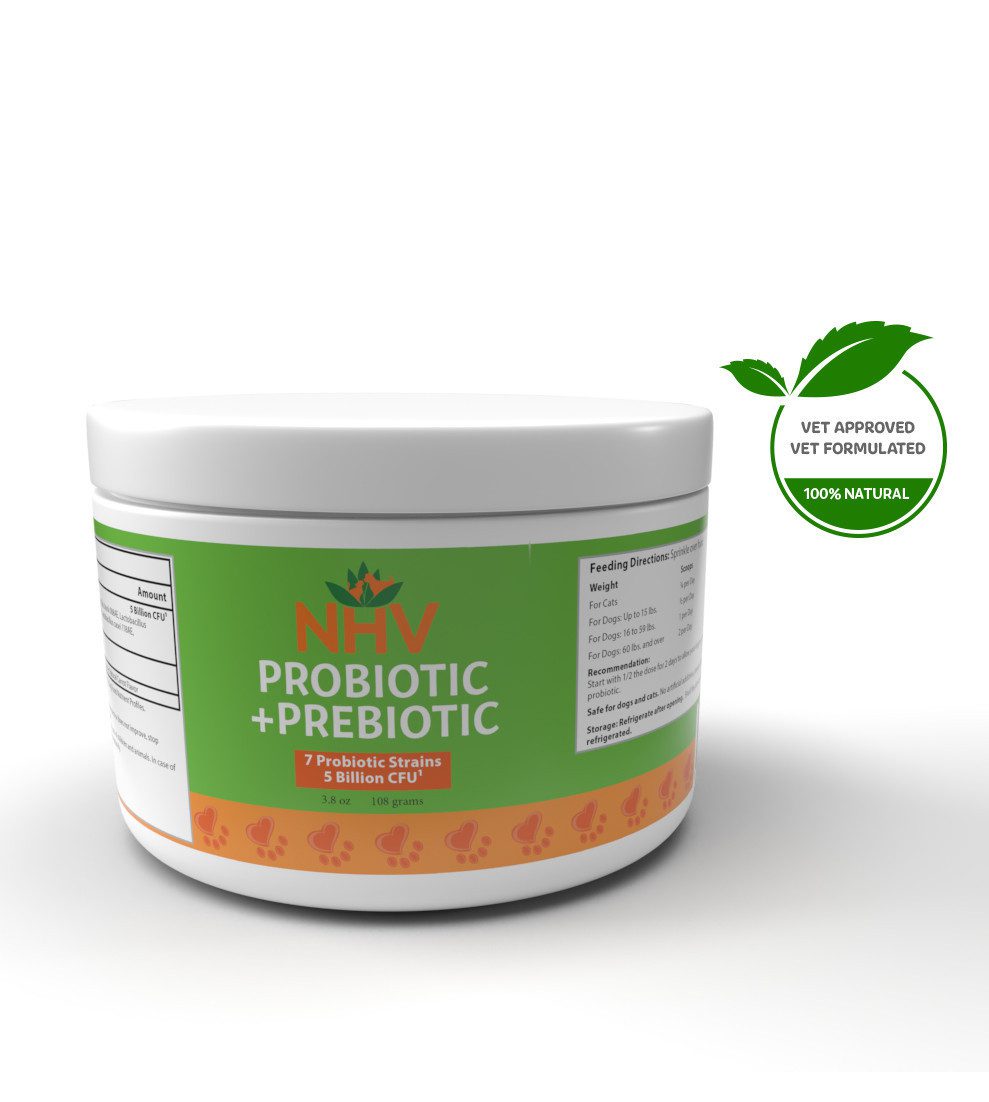
Vet-formulated. Helps with gut, immune, and anxiety support

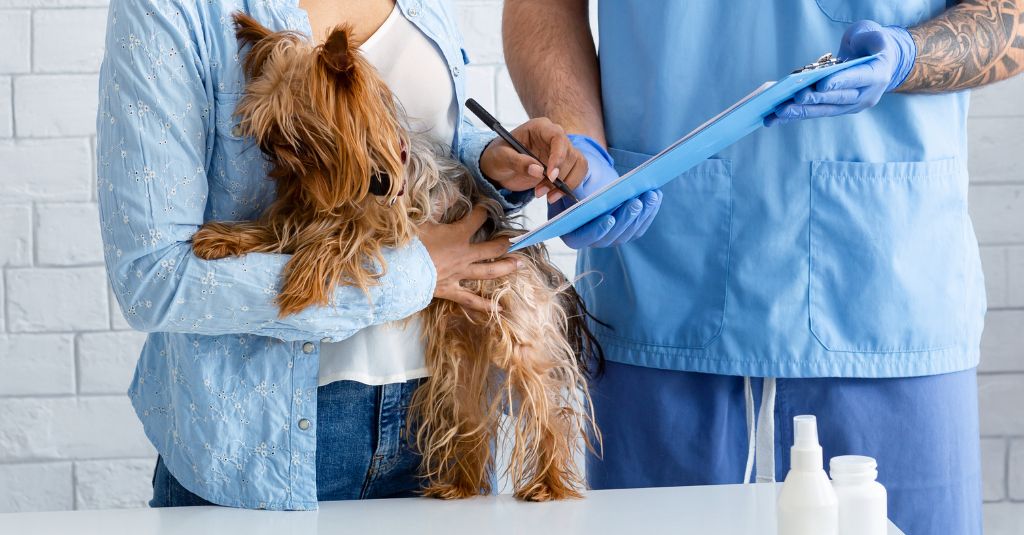
Among the potential hazards that our canine companions may encounter, a dog intestinal blockage timeline emerges as a crucial concern for pet parents. When it comes to our furry friends, their curiosity and love for exploration can sometimes lead to unexpected challenges, and getting something blocking the passage of your little one’s intestine is one of the most critical ones. Understanding how and, most importantly, when to provide support in a case of intestinal obstruction might be a case of life or death. So, let’s delve into the symptoms and prevention and explore how NHV supplements can offer valuable support.
Dogs are notorious for swallowing objects they shouldn’t. An intestinal blockage occurs when one of these materials obstructs the normal flow of food and waste through a dog’s digestive system. Common culprits include small toys, socks, bones, sharp objects, and even harmful foods like chocolate, grapes, or toxic nuts.
Dogs are notorious for swallowing objects they shouldn’t, which can lead to a life-threatening intestinal blockage.
Prevention is the easiest way to support your little one in these cases. Keep dangerous objects and toxic foods out of your dog’s reach, and supervise their playtime. Regular check-ups with your veterinarian can also help detect any issues early.
Otherwise, intestinal obstruction can be life-threatening, and early recognition is crucial for prompt action. If you suspect your dog has ingested a dangerous item or food, consult your veterinarian immediately. A dog intestinal blockage timeline is short, as this is a case of emergency that requires immediate professional attention.
Have your eyes out for symptoms like vomiting, diarrhea, abdominal pain, and loss of appetite. In severe cases, your dog may also be lethargic or in shock. The sooner you seek help, the better the chances of a positive outcome.
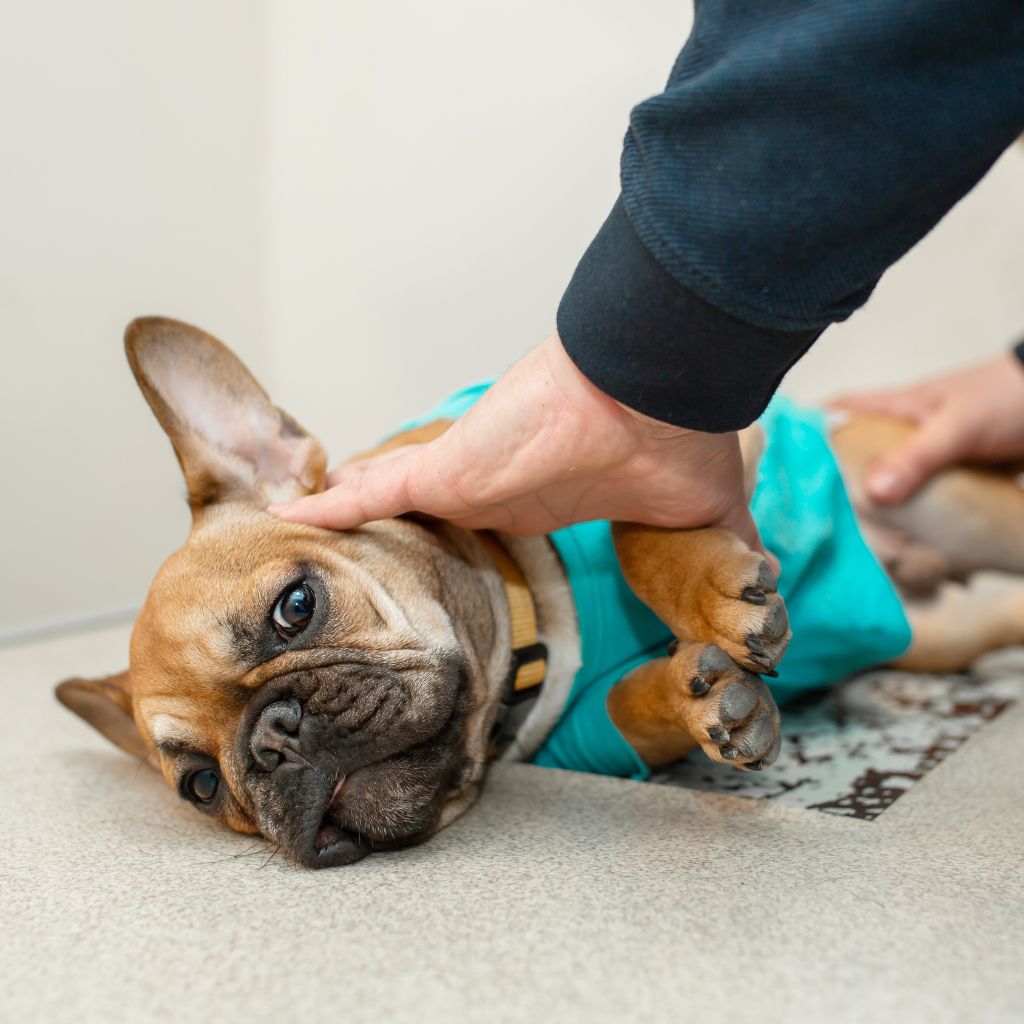
Various treatment options exist for addressing an intestinal blockage in dogs. These may encompass surgical intervention to remove the obstruction. In certain cases, exceptionally skilled veterinarians may employ endoscopy to extract objects, particularly if they are non-sharp and unlikely to exacerbate issues.
In certain situations, non-obstructive foreign bodies may pass naturally, and your vet will provide guidance on the most suitable approach. While you might consider using mineral oil or certain laxative medications, as it is an emergency, it is crucial to consult with your regular vet before offering anything to your beloved furry friend.
Supportive care, coupled with vet-prescribed medications to alleviate symptoms, can also help. For post-urgent care, supplements like NHV TumFlora, NHV Yucca, and NHV Probiotic + Prebiotic can be great allies in your pet’s recovery.
These supplements not only contribute to overall gastrointestinal health but also aid in the healing journey. Specifically, probiotics & prebiotics play a crucial role in maintaining a healthy gut flora balance. This, in turn, helps with digestion and the absorption of essential nutrients for your pet’s well-being after accidentally ingesting something toxic or harmful.
If you’re looking for a dog intestinal blockage timeline, know that the best approach is always to react immediately. This can be a pet owner’s worst nightmare, but with knowledge, quick action, and NHV supplements for post-emergency support, you can increase the chances of a positive outcome. Always consult with your veterinarian for the best advice and care for your furry family member. In the meantime, our team of pet experts is a click away.
digestive support

Yucca & Multi Essentials
bundle and save with pet expert kits
3 month supply for a small to medium size pet.
Just like humans, as our furkiddos age, their body may not be as good at breaking down food and absorbing vital nutrients. NHV’s Digestion Kit is a comprehensive bundle that helps to soothe inflammation, encourage better absorption, and stimulate metabolism.

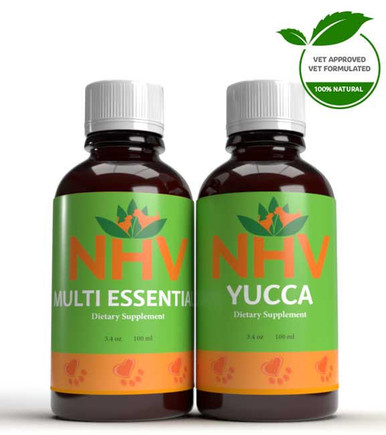
Just like humans, as our furkiddos age, their body may not be as good at breaking down food and absorbing vital nutrients. NHV’s Digestion Kit is a comprehensive bundle that helps to soothe inflammation, encourage better absorption, and stimulate metabolism.

Regardless of your furkiddo’s age, it’s never easy to see them slowing down and having difficulties with their health. If your furry friend is having a tough time with their digestion, then they may not be able to break down and absorb all of the nutrients necessary for maintaining healthy skin, fur and overall health. Our Digestion Kit is formulated to help fill nutritional voids, improve absorption and overall gastrointestinal health.
Just like humans, as our pets age, they may be a little less energetic. That's totally normal! We all require different levels of support at different stages in our lives. Our Digestion Kit contains Yucca, and Multi Essentials, which is a supplement bundle designed to help our pets better absorb nutrients and trigger metabolism. Yucca contains a high level of antioxidant properties that are beneficial for promoting healthy appetite and improving absorption. When it comes to cat sensitive stomach and gastrointestinal dog care, the herbs in Multi Essentials provide many key vitamins and minerals for building and maintaining healthy GI tract health, promoting healthy metabolism, and helping to reduce fatigue. Ingredients like chickweed and dandelion are effective digestive tonics that may help to enhance absorption while herbs like Oregon grape help to reduce indigestion and malabsorption.
It’s great to know that there are ways to support your furkiddo’s digestion naturally! Other than adding natural supports to their daily meals, if you’re wondering about options for gastrointestinal dog care and cat care, a personalized diet for your pet, created by Dr. Amanda, is another great way to support your furry friend!
Made with the finest, organically grown, or ethically harvested herbs. Made specifically for pets, vet-formulated, and vet approved.
Multi Essentials
Select your pet's weight to determine the correct dose.
To be taken twice daily. Determine your pet’s weight and then use the easy chart below to determine the correct dose. This is the minimum dosage.
Pet's Weight Dosage
0 - 15 lb = 0.5 ml
16 - 30 lb = 1.0 ml
31 - 45 lb = 1.5 ml
46 - 60 lb = 2.0 ml
61 - 75 lb = 2.5 ml
Over 75 lb = 3.0 ml
How to Administer
Shake well before use. The easiest method is to use the dropper provided and place the drops into your pet’s food or favorite treat. You can also use the dropper and squirt directly into the pet’s mouth. Some pets can be finicky, if this occurs consider hiding the drops in foods most pet’s love such as fish, chicken or yogurt or a favorite treat. If your pet only eats dry food then soak a few kibbles at feeding time.
For Best Results
Herbal dietary supplements are beneficial to the health and well-being of your pet and are safe for long-term use. Every pet responds to natural herbal supplements differently, therefore it is important to be consistent and administer the product daily. Supplements generally take two to four weeks to take effect, however this will vary from one animal to the next.
Product Storage
All NHV Natural Pet Products are pure herbal extracts and contain no artificial additives, preservatives or coloring. Shelf life after opening is 6 months and must be refrigerated after opening.
All information provided by NHV Natural Pet Products is for educational purposes only.
Regardless of your furkiddo’s age, it’s never easy to see them slowing down and having difficulties with their health. If your furry friend is having a tough time with their digestion, then they may not be able to break down and absorb all of the nutrients necessary for maintaining healthy skin, fur and overall health. Our Digestion Kit is formulated to help fill nutritional voids, improve absorption and overall gastrointestinal health.
Just like humans, as our pets age, they may be a little less energetic. That's totally normal! We all require different levels of support at different stages in our lives. Our Digestion Kit contains Yucca, and Multi Essentials, which is a supplement bundle designed to help our pets better absorb nutrients and trigger metabolism. Yucca contains a high level of antioxidant properties that are beneficial for promoting healthy appetite and improving absorption. When it comes to cat sensitive stomach and gastrointestinal dog care, the herbs in Multi Essentials provide many key vitamins and minerals for building and maintaining healthy GI tract health, promoting healthy metabolism, and helping to reduce fatigue. Ingredients like chickweed and dandelion are effective digestive tonics that may help to enhance absorption while herbs like Oregon grape help to reduce indigestion and malabsorption.
It’s great to know that there are ways to support your furkiddo’s digestion naturally! Other than adding natural supports to their daily meals, if you’re wondering about options for gastrointestinal dog care and cat care, a personalized diet for your pet, created by Dr. Amanda, is another great way to support your furry friend!
Made with the finest, organically grown, or ethically harvested herbs. Made specifically for pets, vet-formulated, and vet approved.
Multi Essentials
Select your pet's weight to determine the correct dose.
To be taken twice daily. Determine your pet’s weight and then use the easy chart below to determine the correct dose. This is the minimum dosage.
Pet's Weight Dosage
0 - 15 lb = 0.5 ml
16 - 30 lb = 1.0 ml
31 - 45 lb = 1.5 ml
46 - 60 lb = 2.0 ml
61 - 75 lb = 2.5 ml
Over 75 lb = 3.0 ml
How to Administer
Shake well before use. The easiest method is to use the dropper provided and place the drops into your pet’s food or favorite treat. You can also use the dropper and squirt directly into the pet’s mouth. Some pets can be finicky, if this occurs consider hiding the drops in foods most pet’s love such as fish, chicken or yogurt or a favorite treat. If your pet only eats dry food then soak a few kibbles at feeding time.
For Best Results
Herbal dietary supplements are beneficial to the health and well-being of your pet and are safe for long-term use. Every pet responds to natural herbal supplements differently, therefore it is important to be consistent and administer the product daily. Supplements generally take two to four weeks to take effect, however this will vary from one animal to the next.
Product Storage
All NHV Natural Pet Products are pure herbal extracts and contain no artificial additives, preservatives or coloring. Shelf life after opening is 6 months and must be refrigerated after opening.
All information provided by NHV Natural Pet Products is for educational purposes only.
bowel support for dogs

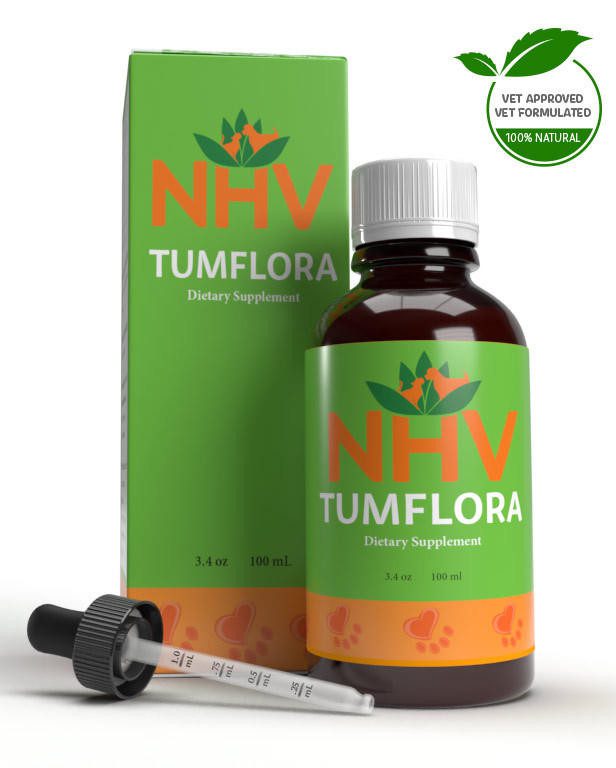
Natural Support for Inflammatory Bowel Disease in Cats
buy 2 and save $3
3 month supply for a small to medium size pet.
If your kitty’s fur is looking dull, they won’t eat their favorite treats and are suffering from vomiting, weight loss, diarrhea, and lethargy, your sweet kitty may have Inflammatory Bowel Disease (IBD in cats). NHV TumFlora can help naturally balance the intestinal flora in your kitty’s body and help maintain a healthy gut. It’s also a great proactive gut supplement for a happy, healthy furbaby.

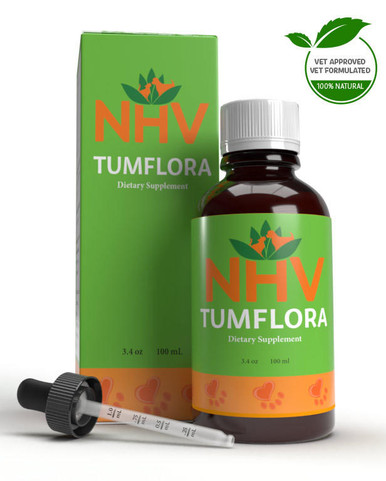
If your kitty’s fur is looking dull, they won’t eat their favorite treats and are suffering from vomiting, weight loss, diarrhea, and lethargy, your sweet kitty may have Inflammatory Bowel Disease (IBD in cats). NHV TumFlora can help naturally balance the intestinal flora in your kitty’s body and help maintain a healthy gut. It’s also a great proactive gut supplement for a happy, healthy furbaby.

Inflammatory Bowel Disease in cats (IBD) is a condition that mainly affects middle-aged to senior kitties, though it can occur at any age. IBD in cats is caused by an inflammatory response to an irritated and inflamed GI tract.
How TumFlora Supports Inflammatory Bowel Disease in Cats
The exact causes of IBD in cats are unknown, however, evidence does suggest that it may arise from an abnormal interaction between bacterial populations in the intestines, diet, a compromised immune system, and other environmental factors as well as genetic abnormalities. TumFlora helps support the body on a variety of levels, which helps address this complex problem.
To help address the imbalance of bacterial populations in the intestines, TumFlora’s blend of herbs work to improve natural intestinal flora. Herbs like licorice and ashwagandha offer support for the immune system, while vitamin and mineral dense herbs like slippery elm and oregon grape help improve nutrient absorption.
In addition to helping with IBD in cats, TumFlora can also help support your kitty if they are suffering from food allergies, gastrointestinal ulcers, and bacterial infections of the gut. Don’t wait for your kitty to have IBD for adding TumFlora, this gentle supplement can be used on a long term proactive basis to support your pet’s gut health.
Inflammatory response thickens the lining of the GI tract, which ends up affecting digestion, absorption of nutrients, and healthy bathroom habits. Cats with Irritable Bowel Disease can experience the following symptoms:
Symptoms of Inflammatory Bowel Disease in Cats
Your veterinarian may recommend treatment for intestinal parasites as well as a combination of medications and diet therapy as a first step. A novel protein, like rabbit or duck, may also be recommended. It takes time and your veterinarian may need to try several different therapies and medications. For a personalized veterinary nutrition plan for your little one, click here.
At NHV, we are a team of holistic veterinarians, pet experts and animal enthusiasts. Get in touch with us if you have any questions or concerns about your pup’s GI tract health or need some extra support.
Made with the finest, organically grown, or ethically harvested herbs. Made specifically for pets, vet-formulated, and vet approved.
Ashwagandha also known as Indian ginseng, is a root that contains a range of beneficial properties including anti-stress and anti-inflammatory action. It also helps defend against microorganisms and balances the immune system.
Boswellia has powerful anti-inflammatory properties and has been used in traditional herbal medicine to treat inflammatory bowel disease.
Chamomile has traditionally been used to help relieve indigestion, expel gas, ease nervous spasms, improve bile flow, and relieve vomiting due to inflammatory bowel disease in cats.
Fennel is an anti-inflammatory, nutritive herb that helps against microorganisms and soothes digestive upset, expels intestinal gas, and relaxes stomach cramps or spasms.
Indian Gooseberry is prized in Ayurvedic medicine for its many health benefits. It may help regulate cholesterol levels, and soothe nausea.
Licorice has been used for centuries for its immunostimulant and anti-inflammatory properties to support against microorganisms, digestion and general well-being. It contains free radical scavengers to help promote healing.
Marshmallow contains demulcent, and diuretic properties. It helps defend against microorganisms, controls bacterial infection, protects the intestinal mucosa, and soothes inflamed mucosa. It has been used in herbalism as a treatment for gastroenteritis.
Oregon Grape contains anti-inflammatory, anti-bacterial, and anti-fungal properties with strong affinities to the liver, digestive system, and mucous membranes.
Slippery Elm contains anti-inflammatory properties and is rich in vitamins and minerals. It is beneficial for gastritis, colitis, duodenal ulcers, and diarrhea.
Select your pet's weight to determine the correct dose.
To be taken twice daily. Determine your pet’s weight and then use the easy chart below to determine the correct dose. This is the minimum dosage.
Pet's Weight Dosage
0 - 15 lb = 0.5 ml
16 - 30 lb = 1.0 ml
31 - 45 lb = 1.5 ml
46 - 60 lb = 2.0 ml
61 - 75 lb = 2.5 ml
Over 75 lb = 3.0 ml
How to Administer
Shake well before use. The easiest method is to use the dropper provide and places the drops into your pet’s food or favorite treat. You can also use the dropper and squirt directly into the pet’s mouth.
Some pets can be finicky, if this occurs consider hiding the drops in foods most pet’s love such as fish, chicken or yogurt or a favorite treat. If your pet only eats dry food then soak a few kibbles at feeding time.
For Best Results
Herbal dietary supplements are beneficial to the health and wellbeing of your pet and are safe for long-term use. Every pet responds to natural herbal supplements differently, therefore it is important to be consistent and administer the product daily. Supplements generally take two to four weeks to take effect, however this will vary from one animal to the next.
Product Storage
All NHV Natural Pet Products are pure herbal extracts and contain no artificial additives, preservatives or coloring. Shelf life after opening is 6 months and must be refrigerated after opening.
Cautions and Contraindications: Do not use TumFlora in pregnant or nursing animals. Speak to your vet before using our products. A second visit is recommended if your pet’s condition does not improve, or deteriorates after continued use of the supplements.
Inflammatory Bowel Disease in cats (IBD) is a condition that mainly affects middle-aged to senior kitties, though it can occur at any age. IBD in cats is caused by an inflammatory response to an irritated and inflamed GI tract.
How TumFlora Supports Inflammatory Bowel Disease in Cats
The exact causes of IBD in cats are unknown, however, evidence does suggest that it may arise from an abnormal interaction between bacterial populations in the intestines, diet, a compromised immune system, and other environmental factors as well as genetic abnormalities. TumFlora helps support the body on a variety of levels, which helps address this complex problem.
To help address the imbalance of bacterial populations in the intestines, TumFlora’s blend of herbs work to improve natural intestinal flora. Herbs like licorice and ashwagandha offer support for the immune system, while vitamin and mineral dense herbs like slippery elm and oregon grape help improve nutrient absorption.
In addition to helping with IBD in cats, TumFlora can also help support your kitty if they are suffering from food allergies, gastrointestinal ulcers, and bacterial infections of the gut. Don’t wait for your kitty to have IBD for adding TumFlora, this gentle supplement can be used on a long term proactive basis to support your pet’s gut health.
Inflammatory response thickens the lining of the GI tract, which ends up affecting digestion, absorption of nutrients, and healthy bathroom habits. Cats with Irritable Bowel Disease can experience the following symptoms:
Symptoms of Inflammatory Bowel Disease in Cats
Your veterinarian may recommend treatment for intestinal parasites as well as a combination of medications and diet therapy as a first step. A novel protein, like rabbit or duck, may also be recommended. It takes time and your veterinarian may need to try several different therapies and medications. For a personalized veterinary nutrition plan for your little one, click here.
At NHV, we are a team of holistic veterinarians, pet experts and animal enthusiasts. Get in touch with us if you have any questions or concerns about your pup’s GI tract health or need some extra support.
Made with the finest, organically grown, or ethically harvested herbs. Made specifically for pets, vet-formulated, and vet approved.
Ashwagandha also known as Indian ginseng, is a root that contains a range of beneficial properties including anti-stress and anti-inflammatory action. It also helps defend against microorganisms and balances the immune system.
Boswellia has powerful anti-inflammatory properties and has been used in traditional herbal medicine to treat inflammatory bowel disease.
Chamomile has traditionally been used to help relieve indigestion, expel gas, ease nervous spasms, improve bile flow, and relieve vomiting due to inflammatory bowel disease in cats.
Fennel is an anti-inflammatory, nutritive herb that helps against microorganisms and soothes digestive upset, expels intestinal gas, and relaxes stomach cramps or spasms.
Indian Gooseberry is prized in Ayurvedic medicine for its many health benefits. It may help regulate cholesterol levels, and soothe nausea.
Licorice has been used for centuries for its immunostimulant and anti-inflammatory properties to support against microorganisms, digestion and general well-being. It contains free radical scavengers to help promote healing.
Marshmallow contains demulcent, and diuretic properties. It helps defend against microorganisms, controls bacterial infection, protects the intestinal mucosa, and soothes inflamed mucosa. It has been used in herbalism as a treatment for gastroenteritis.
Oregon Grape contains anti-inflammatory, anti-bacterial, and anti-fungal properties with strong affinities to the liver, digestive system, and mucous membranes.
Slippery Elm contains anti-inflammatory properties and is rich in vitamins and minerals. It is beneficial for gastritis, colitis, duodenal ulcers, and diarrhea.
Select your pet's weight to determine the correct dose.
To be taken twice daily. Determine your pet’s weight and then use the easy chart below to determine the correct dose. This is the minimum dosage.
Pet's Weight Dosage
0 - 15 lb = 0.5 ml
16 - 30 lb = 1.0 ml
31 - 45 lb = 1.5 ml
46 - 60 lb = 2.0 ml
61 - 75 lb = 2.5 ml
Over 75 lb = 3.0 ml
How to Administer
Shake well before use. The easiest method is to use the dropper provide and places the drops into your pet’s food or favorite treat. You can also use the dropper and squirt directly into the pet’s mouth.
Some pets can be finicky, if this occurs consider hiding the drops in foods most pet’s love such as fish, chicken or yogurt or a favorite treat. If your pet only eats dry food then soak a few kibbles at feeding time.
For Best Results
Herbal dietary supplements are beneficial to the health and wellbeing of your pet and are safe for long-term use. Every pet responds to natural herbal supplements differently, therefore it is important to be consistent and administer the product daily. Supplements generally take two to four weeks to take effect, however this will vary from one animal to the next.
Product Storage
All NHV Natural Pet Products are pure herbal extracts and contain no artificial additives, preservatives or coloring. Shelf life after opening is 6 months and must be refrigerated after opening.
Cautions and Contraindications: Do not use TumFlora in pregnant or nursing animals. Speak to your vet before using our products. A second visit is recommended if your pet’s condition does not improve, or deteriorates after continued use of the supplements.
ibd and diarrhea support

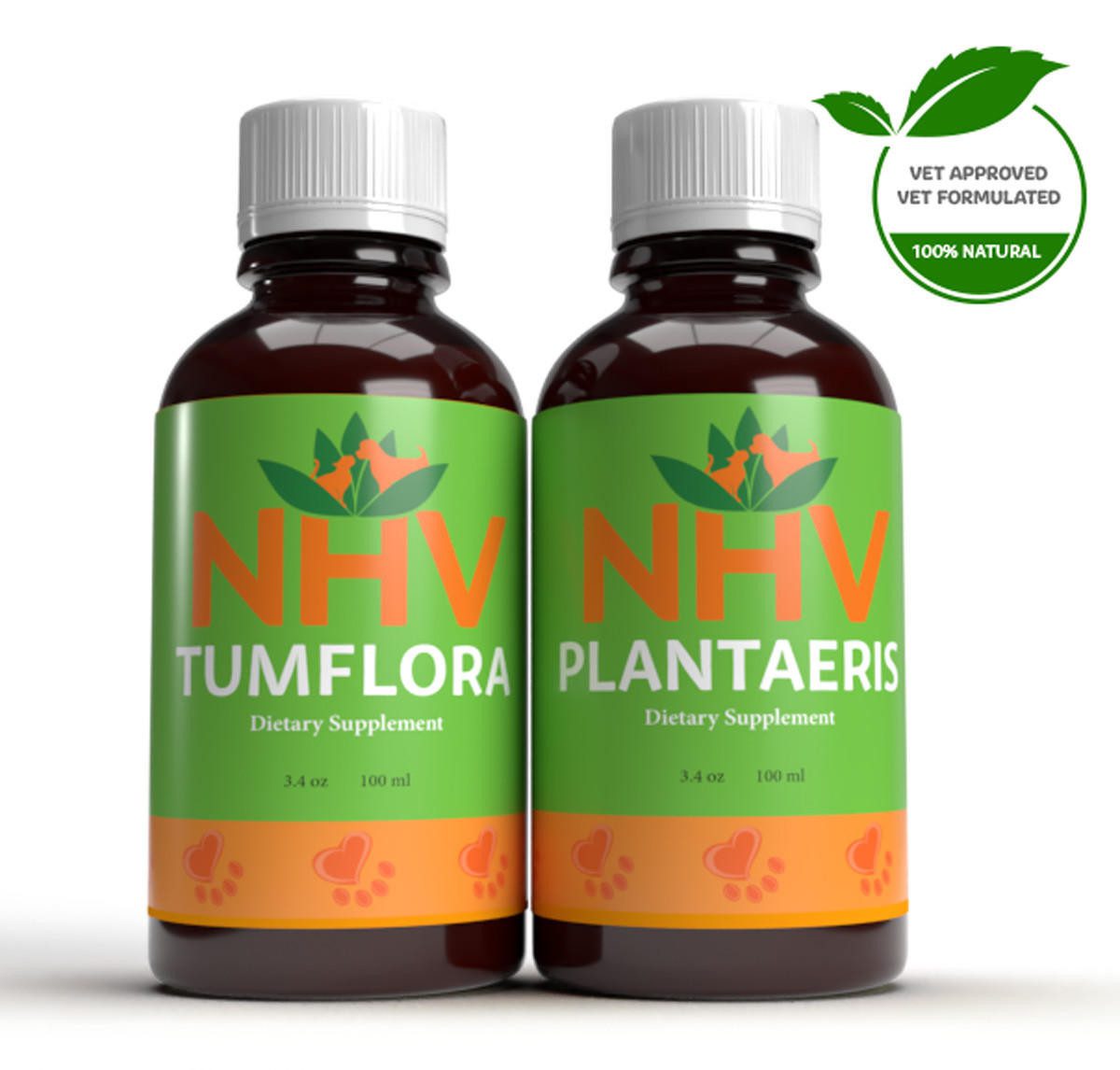
TumFlora & Plantaeris
bundle and save with pet expert kits
3 month supply for a small to medium size
Is your pet losing weight, feeling lethargic, or having irregular bathroom habits? They may be suffering from a common gastrointestinal issue known as Inflammatory Bowel Disease (IBD). Our vet-formulated IBD and Diarrhea Super Support Kit contains a blend of natural ingredients known to help soothe the GI tract and help relieve symptoms like nausea, cramping, and watery stools in pets.

Is your pet losing weight, feeling lethargic, or having irregular bathroom habits? They may be suffering from a common gastrointestinal issue known as Inflammatory Bowel Disease (IBD). Our vet-formulated IBD and Diarrhea Super Support Kit contains a blend of natural ingredients known to help soothe the GI tract and help relieve symptoms like nausea, cramping, and watery stools in pets.
Natural Remedies for Inflammatory Bowel Disease in Dogs and Cats with Additional Diarrhea Support
Typically with inflammatory bowel disease in dogs and cats, your vet will likely recommend a change in diet (since the underlying cause may be related to food allergies). They may prescribe medications and possible nutritional therapy. Our IBD and Diarrhea Super Support Kit contains TumFlora and Plantaeris. These two formulations work together to promote gut health and effective digestion, as well as ease common symptoms of IBD in pets like diarrhea and cramping. Both natural IBD supplements can be taken alongside vet-prescribed medications (though we do recommend spacing the supplements and medication by 2 hours to be easier on your little one).
If you are interested in a gut-friendly nutrition plan, or inflammatory bowel disease diet recommendations for dogs, NHV’s in-house vet Dr. Amanda can work with you to create a personalized plan for your pet's unique needs.
Pets may occasionally experience diarrhea or an upset tummy because maybe they ate too quickly, not enough, or something didn't quite sit right. But consistent runny poos are an alarm bell that something is going on with their digestive health.
TumFlora : contains ingredients like chamomile, licorice root, and ashwagandha, which have been used for centuries to help ease indigestion, muscle cramping and inflammation in the intestinal tract. This balanced IBD pet supplement also contains herbs like Indian gooseberry and fennel seed which may help reduce nausea and encourage healthy movement through the bowels. TumFlora also helps naturally balance intestinal gut flora and can be used alongside probiotics for dogs or cats.
Plantaeris: contains a blend of herbs that work gently and quickly to help alleviate diarrhea and loose stools. Herbs like barberry and bayberry contain soothing properties to help control diarrhea-causing bacteria and control infection. This blend is well-balanced with ingredients like myrrh, and thyme, which may help to expel gas and may promote healing and relief for overall digestive discomfort.
When your furkiddo has IBD, inflammatory cells invade the gastrointestinal tract of your pet, which encompasses the stomach, small, and large intestine. Once inflammatory cells start taking over the GI tract, the intestinal wall may thicken over time and disrupt the absorption and movement of food. It’s unclear what may cause IBD in dogs, cats or other pets, but some potential causes are food allergies, parasites, and autoimmune conditions. A fairly common symptom of IBD in dogs and cats is diarrhea because the GI tract is damaged, so food may not be fully digested or eliminated. If we are to use a simple analogy, pets with inflammatory bowel disease can have diarrhea that may range from a soft-serve ice cream consistency to pretty much like clear water.
Having a healthy pet means the world to us at NHV. Providing your furkiddo with natural support for their digestion and gastrointestinal tract can help improve their quality of life and promote vitality! Apart from adding supplements to their daily care plan, learn more about what you can do to help your pet with IBD here.
Select your pet's weight to determine the correct dose.
Made with the finest, organically grown, or ethically harvested herbs. Made specifically for pets, vet-formulated, and vet approved.
Ashwagandha has been used for over millennia in Ayurvedic medicine for its anti-inflammatory, antibacterial and restorative properties.
Boswellia is beneficial for ringworm, diarrhea, liver issues. Studies are also showing promising results when used for easing symptoms of IBD and asthma.
Chamomile has soothing properties to help expel gas and reduce vomiting caused by IBD. Its sedative and calming properties are helpful for digestive issues like IBD in dogs and cats.
Fennel has anti-inflammatory and carminative properties that help to relax spasms, and help relieve cramping as well as encourage healthy appetite.
Indian Gooseberry has a long history of use in Ayurveda for a range of issues, including easing diarrhea, nausea and heartburn.
Licorice is an herb with an affinity for the digestive, respiratory, and endocrine systems. Its anti-inflammatory properties help to ease tissue damage, relieve flatulence and help to decrease bloating.
Marshmallow is a soothing herb whose anti-inflammatory properties are beneficial support for GI tract conditions like inflammatory bowel disease in dogs and other pets, gastroenteritis, ulcerative colitis, enteritis are more.
Oregon Grape acts as a mild diuretic and laxative to help ease indigestion. It also contains anti-fungal and antibacterial properties to help eliminate infections.
Slippery Elm contains a range of beneficial nutrients that may help decrease symptoms of diarrhea, colitis and gastritis.
Barberry has a long history of use for soothing inflammation, easing diarrhea, and helping to eliminate infections in the intestines.
Bayberry contains tannins, resins, and gums that are effective at fighting bacterial infections and aiding with diarrhea.
Chamomile has been used for centuries as a digestive tonic to soothe digestive discomfort and encourage healing.
Chinese Peony contains healing properties to help relax muscle spasms and stomach discomfort.
Ginger is rich in enzymes that encourage digestion, circulation and improve intestinal muscle tone.
Mullein is an herb known to help soothe and lubricate the GI tract, as well as help to relieve diarrhea and cramps.
Myrrh is rich in anti-inflammatory and antioxidant properties which offer relief for overall digestive discomfort and add immune support.
Oregon Grape is beneficial for stimulating bile flow (may improve digestion) encourage the digestion of nutrients.
Thyme is beneficial for helping to relieve intestinal gas and for expelling foreign bodies such as parasites
Natural Remedies for Inflammatory Bowel Disease in Dogs and Cats with Additional Diarrhea Support
Typically with inflammatory bowel disease in dogs and cats, your vet will likely recommend a change in diet (since the underlying cause may be related to food allergies). They may prescribe medications and possible nutritional therapy. Our IBD and Diarrhea Super Support Kit contains TumFlora and Plantaeris. These two formulations work together to promote gut health and effective digestion, as well as ease common symptoms of IBD in pets like diarrhea and cramping. Both natural IBD supplements can be taken alongside vet-prescribed medications (though we do recommend spacing the supplements and medication by 2 hours to be easier on your little one).
If you are interested in a gut-friendly nutrition plan, or inflammatory bowel disease diet recommendations for dogs, NHV’s in-house vet Dr. Amanda can work with you to create a personalized plan for your pet's unique needs.
Pets may occasionally experience diarrhea or an upset tummy because maybe they ate too quickly, not enough, or something didn't quite sit right. But consistent runny poos are an alarm bell that something is going on with their digestive health.
TumFlora : contains ingredients like chamomile, licorice root, and ashwagandha, which have been used for centuries to help ease indigestion, muscle cramping and inflammation in the intestinal tract. This balanced IBD pet supplement also contains herbs like Indian gooseberry and fennel seed which may help reduce nausea and encourage healthy movement through the bowels. TumFlora also helps naturally balance intestinal gut flora and can be used alongside probiotics for dogs or cats.
Plantaeris: contains a blend of herbs that work gently and quickly to help alleviate diarrhea and loose stools. Herbs like barberry and bayberry contain soothing properties to help control diarrhea-causing bacteria and control infection. This blend is well-balanced with ingredients like myrrh, and thyme, which may help to expel gas and may promote healing and relief for overall digestive discomfort.
When your furkiddo has IBD, inflammatory cells invade the gastrointestinal tract of your pet, which encompasses the stomach, small, and large intestine. Once inflammatory cells start taking over the GI tract, the intestinal wall may thicken over time and disrupt the absorption and movement of food. It’s unclear what may cause IBD in dogs, cats or other pets, but some potential causes are food allergies, parasites, and autoimmune conditions. A fairly common symptom of IBD in dogs and cats is diarrhea because the GI tract is damaged, so food may not be fully digested or eliminated. If we are to use a simple analogy, pets with inflammatory bowel disease can have diarrhea that may range from a soft-serve ice cream consistency to pretty much like clear water.
Having a healthy pet means the world to us at NHV. Providing your furkiddo with natural support for their digestion and gastrointestinal tract can help improve their quality of life and promote vitality! Apart from adding supplements to their daily care plan, learn more about what you can do to help your pet with IBD here.
Select your pet's weight to determine the correct dose.
Made with the finest, organically grown, or ethically harvested herbs. Made specifically for pets, vet-formulated, and vet approved.
Ashwagandha has been used for over millennia in Ayurvedic medicine for its anti-inflammatory, antibacterial and restorative properties.
Boswellia is beneficial for ringworm, diarrhea, liver issues. Studies are also showing promising results when used for easing symptoms of IBD and asthma.
Chamomile has soothing properties to help expel gas and reduce vomiting caused by IBD. Its sedative and calming properties are helpful for digestive issues like IBD in dogs and cats.
Fennel has anti-inflammatory and carminative properties that help to relax spasms, and help relieve cramping as well as encourage healthy appetite.
Indian Gooseberry has a long history of use in Ayurveda for a range of issues, including easing diarrhea, nausea and heartburn.
Licorice is an herb with an affinity for the digestive, respiratory, and endocrine systems. Its anti-inflammatory properties help to ease tissue damage, relieve flatulence and help to decrease bloating.
Marshmallow is a soothing herb whose anti-inflammatory properties are beneficial support for GI tract conditions like inflammatory bowel disease in dogs and other pets, gastroenteritis, ulcerative colitis, enteritis are more.
Oregon Grape acts as a mild diuretic and laxative to help ease indigestion. It also contains anti-fungal and antibacterial properties to help eliminate infections.
Slippery Elm contains a range of beneficial nutrients that may help decrease symptoms of diarrhea, colitis and gastritis.
Barberry has a long history of use for soothing inflammation, easing diarrhea, and helping to eliminate infections in the intestines.
Bayberry contains tannins, resins, and gums that are effective at fighting bacterial infections and aiding with diarrhea.
Chamomile has been used for centuries as a digestive tonic to soothe digestive discomfort and encourage healing.
Chinese Peony contains healing properties to help relax muscle spasms and stomach discomfort.
Ginger is rich in enzymes that encourage digestion, circulation and improve intestinal muscle tone.
Mullein is an herb known to help soothe and lubricate the GI tract, as well as help to relieve diarrhea and cramps.
Myrrh is rich in anti-inflammatory and antioxidant properties which offer relief for overall digestive discomfort and add immune support.
Oregon Grape is beneficial for stimulating bile flow (may improve digestion) encourage the digestion of nutrients.
Thyme is beneficial for helping to relieve intestinal gas and for expelling foreign bodies such as parasites
Published: November 22, 2023